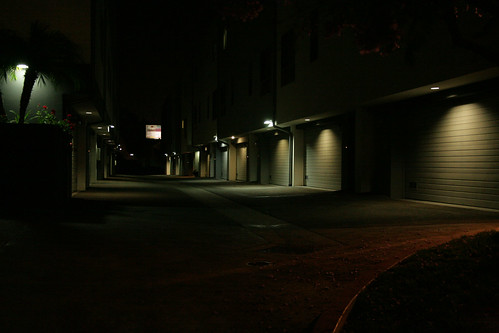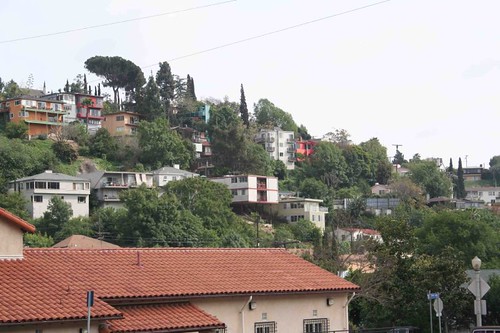
Situational Awareness
By Brett A. Fernau ©2014 All Rights Reserved
What is “situational awareness?” Very simply, it is knowing what is going on around you. You may well believe that you already have this. Of course you know what’s going on around you. Do you really? And more importantly, do you always know?
When you go out for a walk, do you take your smart-phone with you and catch up on your texts, listen to messages, return calls? How is your situational awareness while you do that? Do you plug in your headphones and listen to music while you walk? The music inspires you to walk a little faster and it relieves some of that stress that has built up in you during the course of the day. It makes you happy. But how does it affect your situational awareness?
When you walk out your front door in the morning to get in your car and go to work, do you pause at the threshold and look around before locking the door and proceeding down the sidewalk? As you walk toward your car do you focus on just going from point A to point B, or do you look around you to see what’s going on? Of course you look in your mirrors and check for other cars before you pull out into the street. Do you change stations on the radio, set the GPS, make or take phone calls while you drive? How does that affect your ability to react to what other drivers are doing around you? Does situational awareness apply to driving a motor vehicle?
You make it safely to your office and park your car. As you exit your vehicle are you aware of what is going on in the parking garage, or on the street where you parked? Or are you running late and just need to concentrate on getting to where you need to be? During your work day, how much attention do you have on your surroundings? Would you notice if an angry customer showed up looking for trouble, or a disgruntled, recently terminated, fellow employee came in seeking revenge? You’ve survived the workday and it is time to go home. Are you aware of who is in the elevator with you, who is in the lobby of the building as you walk toward the exit? Is someone following you as you walk down the street toward your car? Who is in the area around where your car is parked? If you parked in the building’s parking garage, was there someone hanging around the entrance who is now following you toward your car? You get into your car and drive out onto the street toward home. Has that car that pulled out behind you been following you for quite some time? As you approach your house, is that same car still following you?
Situational awareness is knowing what is going on around you at all times and in all situations. To know that, you must look. If you are preoccupied with work, or a personal problem; if you are distracted by a phone call, or a text message; then you have put yourself in some degree of danger. How much danger you may be in depends upon the situation. At home, in your backyard the danger may be negligible. In a parking garage, at the local shopping mall, at 11:00 p.m. the danger may be significantly greater. In your car, driving in traffic at 60 m.p.h., the danger could be quite extreme. Awareness of where you are, of who and what surrounds you, and of the time of day are all elements which define the situation in which you find yourself.
We are admonished, these days, not to be judgmental. In terms of situational awareness, you must constantly use your very best judgment to evaluate your surroundings in order to stay safe. Judgment requires you to ask:
What are the intentions of that person following me, or that group of people loitering on the sidewalk in front of me?
Is there enough time for me to cross that street without being struck by an oncoming vehicle?
Do I open my front door to that stranger who just rang the bell?
I just heard a loud noise outside, do I go investigate it?
Is this a safe place to park my car while I’m away for a couple of hours?
I’m just going into that store for a minute. Do I leave my GPS in its dashboard mount or put it away out of sight?
Is this offer I just received too good to be true?
Someone just bumped the rear of my car on this dark street. Should I get out and deal with it? Should I call the police?
You need to use judgment to make a decision. Is the situation you are in dangerous? How do you know? What is there about the situation which could cause you harm? You assess all of the elements that you see, you add that to what you know, you consider what skills you have that might mitigate the danger in some way and then you use your judgment to make a decision about how to handle it. Do you attack, retreat, hide, avoid, or ignore it? How do you decide? You weigh all the factors and you make a judgment as to the danger level. You make a judgment on the safest way to proceed and then you do something, all based upon your own best judgment. If you don’t make a decision, the environment will make it for you. If you take the non-judgmental route, the outcome will rarely be in your best interests.
A high degree of situational awareness gives you knowledge about your surroundings so that you can make sound judgments about how to proceed. A low degree of situational awareness can get you into serious trouble. Most people take for granted the idea that they know what is going on around them, but if you were to stop, at random, someone on the street and ask them questions about their surroundings, you would find that their situation awareness was quite minimal.
It is an inherent human ability. A baby has some awareness of what is going on around him, he may not know exactly what activity is going on nearby, but he knows that something is happening. He recognizes his mother’s voice, perhaps, and turns his head in that direction. That baby has some situational awareness, it almost seems instinctual, but in reality it is a learned, survival behavior reinforced by positive and negative feedback. His mother’s voice means food, warmth and love and so, of course, he reacts positively to her voice. If he hears a loud noise, he is startled. He wonders what it is, he is confused and defenseless and cries out. He is aware of his surroundings. As you grow older, you gain experience; you know what many sounds mean, you learn what things are dangerous to you, what odors indicate toxic substances; you use your senses and your knowledge to attempt to navigate safely through your environment. When you are seeking information about your surroundings, your level of situational awareness goes up. When you are tired, bored, complacent, or distracted, your level of situational awareness goes down.
As with any skill you have, be it running, jumping, singing, playing piano, or anything you do consciously, situational awareness can be drilled and practiced so you get better and better at it. It is something that you do, not an instinct and not a stimulus-response mechanism. With just a little regular practice you can get quite good at it. Here’s how you would go about raising your level of situational awareness. Locate a safe area in daylight hours and go for a walk. If you have a partner or a friend with you, all the better, but you can do this by yourself as well. Have your partner give you this command: “Look around you and find something.” Perform the action and tell your partner what you found. Your partner would acknowledge your answer with: “Good,” and give you the same command newly. Continue in this way until your partner feels more aware of his surroundings and then switch roles where you give the command and your partner does the looking and answering. Do this exercise as you walk around your neighborhood, or through the park, anywhere you might be. You can even do it by yourself as you walk around, or even as you sit in your chair at home. Train yourself to look around and really see what is there, not what you expect to find, but what is actually there. You may be surprised by how much of what is around you that you were not really noticing. Do the drill everywhere you go. Your situational awareness will get better and better. Expand the drill by not just looking, but, instead, use your other senses, hearing, smell, taste, touch. What do you hear around you? What else do you hear? What made the sound? What do you smell in your environment? Can you taste anything on the wind? How does the wind feel on your skin? You can be more aware of your environment than you ever imagined and that awareness can save your life.
Get outside, move around, extend your senses, know what is going on around you, in your yard, on your block, in your neighborhood, in your city, in your country and in your world. Get as much information as you can about your environment, seek truth, look beneath the surface, behind the scenes, under the rocks, evaluate the data you receive, verify the sources, question motives, and keep your own counsel. Situational awareness extends beyond your immediate surroundings. Find out what is going on, ask questions, communicate, look for yourself, read, write, listen, observe and when it becomes necessary to act to insure your own survival and that of your loved ones, you will have all the information you need to make decisions about just what you need to do.
Situational awareness is only the first of the fundamental skills you need to survive in the world as it is today. But your situational awareness may well help you avoid needing any but the most rudimentary self-defense skills. Your best defense against any hazardous situation is to avoid it. You aren’t expendable. If are aware of what you are getting yourself into, you can choose not to get yourself into it. If you can’t avoid it, then you will need offensive and defensive skills and the willingness to use them. As you become more aware of the world around you, you will soon see for yourself what kinds of skills you need to survive the worst that can happen to you and your loved ones. Figure out which of those skills best suit your abilities and begin learning them. Get yourself in good physical condition, get enough sleep, eat a healthy diet and you might just have a chance in whatever happens next on this troubled planet of ours.
